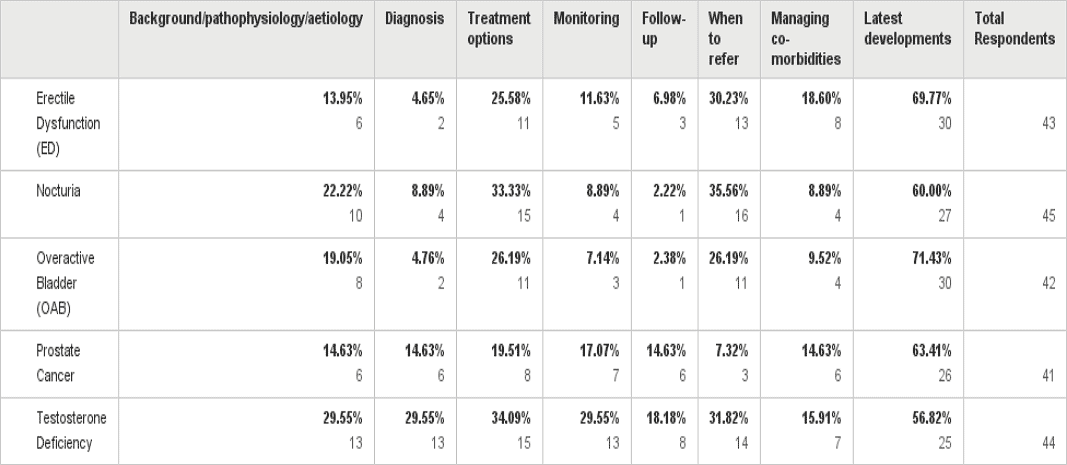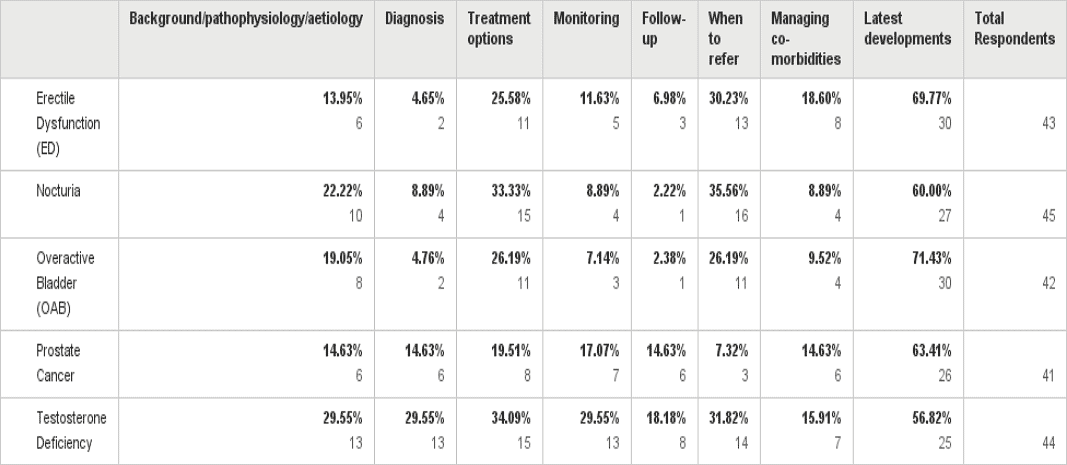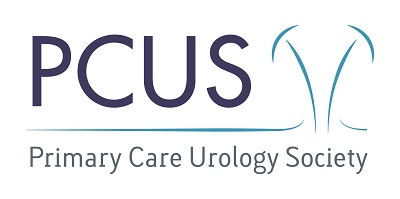PCUS 2017 Survey Results
Throughout 2017 PCUS has been running a survey to understand from professionals working in primary care exactly what they feel are their educational needs around urological conditions. The plan is also for this feedback to help shape future activities of the PCUS.
To date we’ve had responses from 52 individuals, most (67%) of whom are practising GPs. Others were practice nurses, community urology nurses and a handful of consultants.
We’re pleased to share the findings to date, but please, if you haven’t already done so, feel free to complete the survey which will be ongoing.
Educational needs
Table 1 illustrates the conditions in which most respondents are particularly interested. Most participants are interested in erectile dysfunction and prostate cancer. These topics are followed by BPH, testosterone deficiency, general men’s health and overactive bladder.
Table 1: Conditions that are of most interest to primary care
| Condition | % of respondents who are interested in the condition |
Erectile dysfunction |
44% |
Prostate cancer |
44% |
BPH |
39% |
Testosterone deficiency |
38% |
General men’s health |
38% |
Overactive bladder |
33% |
Blood in the urine |
25% |
Incontinence |
25% |
Bladder cancer |
21% |
Nocturia |
21% |
Prostatitis |
21% |
STIs |
21% |
Urinary tract infections |
21% |
Interstitial cystitis |
19% |
Peyronie’s disease |
17% |
Bladder prolapse |
12% |
Kidney & ureteral stones |
13% |
Kidney cancer |
8% |
Other: |
6% |
Table 2 illustrates where the participants felt they particularly lacked knowledge within a specific therapy area. For all the five topics listed, most participants wanted to hear more about “Latest developments” in the specific area.
For erectile dysfunction and nocturia, nearly one-third of responders want to know about “when to refer”. Over 20% of responders want to know about “when to refer” and “treatment options” for overactive bladder. For prostate cancer, almost 20% of responders want to know about “treatment options” and over 30% want to know about “treatment options” for testosterone deficiency.
Table 2: Areas where the participants particularly lack knowledge within a specific therapy area

SCROLL »
Further education areas in selected conditions are shown in Table 3. Similarly to the previous question, for all the five topics listed, most participants wanted to hear more about “Latest developments” in the specific area.
For erectile dysfunction and nocturia, over 30% of responders want to know about “treatment options”. And this was over 40% for testosterone deficiency. For overactive bladder, over 20% of responders want to know about “when to refer”. For prostate cancer, up to 15% of responders want to know about “monitoring”.
Table 3: Further education in selected conditions

SCROLL »
Almost 40% of the respondents were keen to take part in educational activities in selected therapy areas from Table 1.
Learning format
When asked about preferred learning formats, 69% of participants prefer plenary sessions and 64% and 60% prefer workshop/interactive sessions or case-study based learning, respectively.
Challenges in improving primary care management
Many challenges were identified by the participants for improving their daily practice but key amongst these were:
- Time constraints for learning or sharing best practice
- Timely access to investigation results and timely advice/referral
- Lack of primary care specialists meetings
- Low confidence of primary care peers in specialist urology areas
- Improved communication with secondary care
- Reliable and up to date information and guidance on a website
- Education/experience of workforce
- Identifying the patients that can be managed safely in primary care without unnecessary referral
As mentioned earlier the PCUS will keep this survey running to continue the dialogue with its members and other professionals wishing to express their views and become involved. This will facilitate the delivery of education across appropriate topics and in a preferred format.
This is a PCUS initiative, supported by Ferring Pharmaceuticals Ltd.
Please note your individual responses and details will be kept confidential to PCUS and will not be divulged to any third party.

